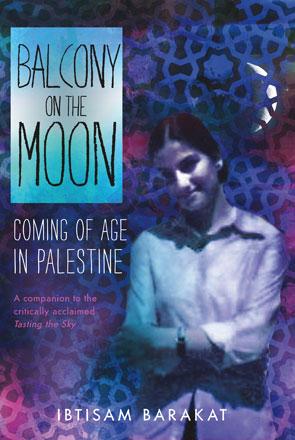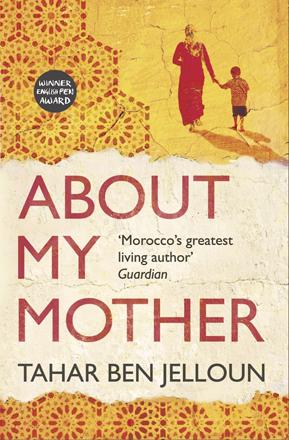You are here
Determined to write
By Sally Bland - Jan 14,2018 - Last updated at Jan 14,2018

Balcony on the Moon: Coming of Age in Palestine
Ibtisam Barakat
New York: Farrar Straus Giroux, 2016
Pp. 217
With a lyrical pen, Ibtisam Barakat tells of growing up in Ramallah when it was a small town, not the bustling city that often figures into today’s news. Starting with the 1967 war, which kept her family running from shelter to shelter, only able to return to their home four and a half months later, it is a story of life under occupation.
Yet, most of her memoir — in fact, the most compelling parts, centre on her family and her own unstoppable drive to get an education, to develop her passion for writing and to surmount the hurdles placed in the path of females.
The stone house from which the family fled during the war, and then returned to, has a special place in Barakat’s memories, partly because its semi-rural surroundings provided many opportunities for outdoor play and observing nature. But her parents decide to sell it after Israeli soldiers turn a nearby hill into a training ground and begin knocking on their door for no good reason.
“I think about that house every day, but it is no longer made of stone. Now it is made of memories — hours spent watching migrating birds in the sky, waiting for dinner, for Mother to come home from shopping trips, or for Father to come home from driving his truck.” (p. 6)
Their new apartment has its advantages, however. For the first time the Barakats have hot and cold running water and electricity. This is the first of several subsequent moves dictated not by the occupation but by the family’s economic situation and convenience of location.
Barakat’s experience of war at the age of three left her fearful, but her struggle to overcome her fear is what led to her love of books and reading: “Only when I enter the imaginative world of a story do I win against the fear of war beginning again and destroying everything… I also triumph over fear by listening to old people tell of memories that bring peaceful, faraway worlds to me. I like how their faces light up when they describe the happy times of hurreyyah, freedom.” (pp. 9-10)
It is not long before she aspires to write her own stories. Her sharp observation of the world around her and her fascination with words helps her to develop a fluid, original and expressive prose style that makes this book enjoyable reading.
Other challenges are not so easily overcome. She chafes at the restrictions imposed on girls. In a family of two girls and five boys, she questions why only she and her sister are expected to help with the housework, while her brothers are free to roam. As she grows older, she is distressed at seeing classmates taken out of school to be teenage brides, as happened to her mother.
It is interesting that she does not resent her brothers as such, nor her parents, who are quite open about preferring to have boys over girls, and impose restrictions on her like not riding a bicycle. In her early teens, she sees a copy of the Universal Declaration of Human Rights at an UNRWA office and copies it into her notebook. She begins to articulate her instinctive sense of justice and fairness more aggressively and in rights-based language when challenging her parents. Yet, one understands that she has inherited her sense of justice from her parents in the first place, and it coexists, however uneasily, with her love for her family. In her words: “thanks to Mother, I [and my siblings] know how to talk back, argue, and fight. Mother does not want us doing this with her, but because she does it, we have learned to do it”. (p. 81)
Barakat’s portrayal of her parents is both endearing and conflicted. Both are rooted in tradition but also seeking change. Both were deprived of more than a rudimentary education — her father due to his family’s poverty which led him to start working in a stone quarry at the age of eight, her mother due to having been married off at fifteen. They are loving but inconsistent.
Sometimes they support her ambitions; at other times, they think she is going too far as when at the age of twelve, she takes a summer job at a factory. Her mother constantly rails against having married early, yet, at one point brings a suitor for her daughter before she has completed high school. Only Ibtisam’s playful, inventive and determined spirit get her off the hook.
“Balcony on the Moon” is the sequel to Barakat’s earlier memoir “Tasting the Sky” (2007). It ends in 1981 with Barakat scoring so high on the tawjihi exam that she qualifies for a scholarship to study at Birzeit University. Today she lives in the United States, and seems to have written this book to spread understanding of the Palestinian cause.
In fact, it is a perfect book to introduce Palestine to those not inclined to read a dense history book, but Barakat’s courage and her battle with tradition make it good reading even for those who know the facts of Palestine’s history which she weaves into the narrative.
Related Articles
About My MotherTahar Ben JellounTranslated by Ros Schwartz and Lulu NormanLondon: Telegram, 2016Pp.
Salt HousesHala AlyanNew York: Mariner Books, 2018, 310 pp In “Salt Houses”, Palestinian-American author Hala Alyan follows four genera
A Country of Words: A Palestinian Journey from the Refugee Camp to the Front PageAbdel Bari AtwanLondon: Saqi, 2008Pp.

















